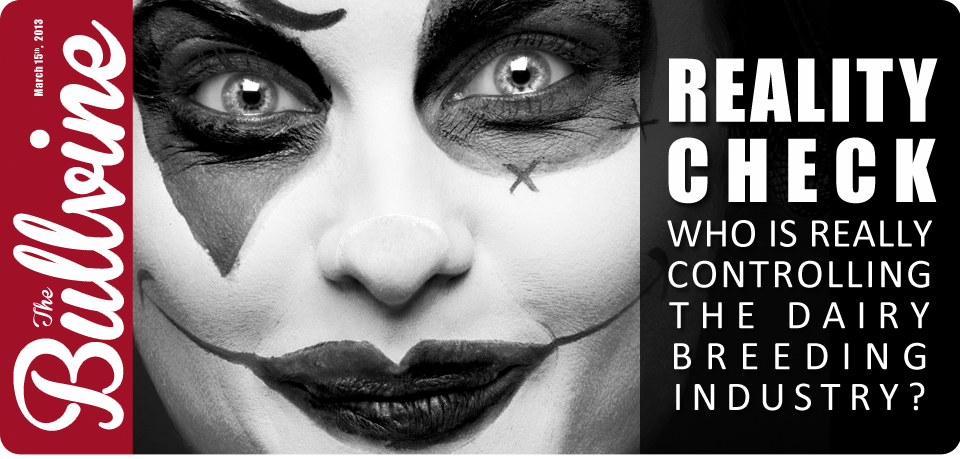Often I find as an industry we are guilty of living in a bubble. While sometimes that has served us well, other times there are situations where it for sure has hurt the dairy breeding industry as a whole. However, like all bubbles, this will have to burst in order for the industry to advance, otherwise the dairy cattle breeding industry will become irrelevant.
There is no question that the dairy breeding industry is going through times of great change. Genomics has had a massive effect on not only how we prove bulls, but also on the sources of revenue and the focus of many breeding programs. There has been great discussion about what the changes in April will have on the industry (Read more: How Genomics is Killing the Dairy Cattle Industry). There are some far greater issues that many breeders need to think about.
Some Big Hitters Are Coming To the Plate
One such issue is the entry of Pfizer/Zoetis into the animal genetics game. There is no question that companies like Pfizer have the resources and the experience to come into industries and dominate. When you compare the size and revenue of the Animal Health market to that of the dairy cattle breeding industry, you really have to wonder why Pfizer would even bother. There is no question that DNA testing is a very cool science, but companies like Pfizer don’t do things because they think that it is cool. They do it because they know they can make money.
When you step back and look at this from a 50,000-foot view, I start to think, is this Pfizer wanting to come and take over dairy cattle breeding? On the other hand, is it that Pfizer sees how they can protect their much larger revenue source, animal health? Walk with me on this one. If it is possible to understand genomics to such an extent that we can breed a better cow, does that not include a cow that is more resistant to disease, parasites, and bacteria? Now we’re talking about core revenue sources for Pfizer animal health, now called Zeotis.
That is why when I first saw the announcement from Pfizer in May 2012 about how Canadian Dairy Network, Holstein Canada, Pfizer Animal Health, The Semex Alliance and its owners are going to partner to support delivery of genetic services to the Canadian dairy industry it really got me thinking about is this a good thing or should we be concerned? While the public relations side of this looked all great with the message that the alliance gives dairy producers access to new genetic testing services, I could not help but think what does this mean if Pfizer/Zoetis now has direct access to all the genomic information not only in Canada but also indirectly for the world?
Also of interest about this move was that instead of being signed by all the members of the industry it was done very selectively. Instead of being signed by say Canadian Livestock Genetics Association it was done exclusively with the Semex Alliance. Is there a partnership between Semex and Pfizer that we are not aware of? Have we as an industry, or our representatives, on our behalf made decisions that we may all regret? While I am sure from first glance this agreement looked pretty basic, I can’t help but wonder if there are much greater ramifications that have not really been thought through.
Information is Power, But who controls the information?
With these questions about genetic evaluations and genomics, you can’t help but think about the heated discussion around the Council on Dairy Cattle Breeding (CDCB) and who controls genetic evaluations in the US (Read more: Council On Dairy Cattle Breeding: Land of the Free and Home of the Brave?). The Cooperative Agreement with the USDA Agricultural Research Service (ARS) pertaining to the transfer of the USDA-‐ARS dairy genetic evaluation service to the CDCB has certainly had many asking who does have control?
While the Bullvine has request several times to do an interview with CDCB officers , Ole Meland, (Chair), Jay Mattison (Vice Chair), Becky Payne (Secretary) and Gordon Doak (Recording Secretary), we have still not yet been granted the opportunity.
No Demand Means No Market
Of course there is a much bigger issue I think every breeder needs to think about. While in Canada most breeders are pretty immune to having to think about market demand, you only have to look at the US and Australia to see what happens when market demand goes south. If consumers are not drinking milk, it does not take long for the industry to dry up.
Worldwide milk consumption in relation to population growth is falling. While yes total consumption is increasing, we are not keeping pace with other beverages.
With greater international supply and less demand, it doesn’t take long to drive price and revenue down (Read more: Why the Future of the North American Dairy Industry Depends on Supply and Demand). There is no question that breeders and the industry as a whole, needs to pay greater attention to consumer demand as it will have the greatest impact on our future.
The Bullvine Bottom Line
There is no question the world is changing. It always is and always will. The question becomes are you ahead of the change or behind it? If we continue to operate in a bubble or stick our heads in the sand, we will not be the ones driving our own future, but instead will be handed the scraps from the future decided by others. That is why it is important to know who is controlling the dairy breeding industry?
Get original “Bullvine” content sent straight to your email inbox for free.



















Leave a Reply
You must be logged in to post a comment.